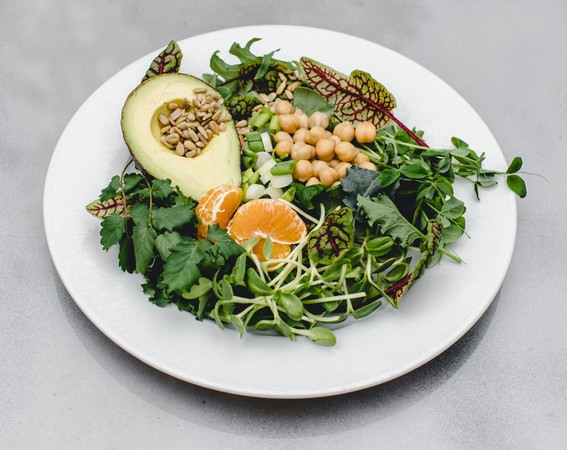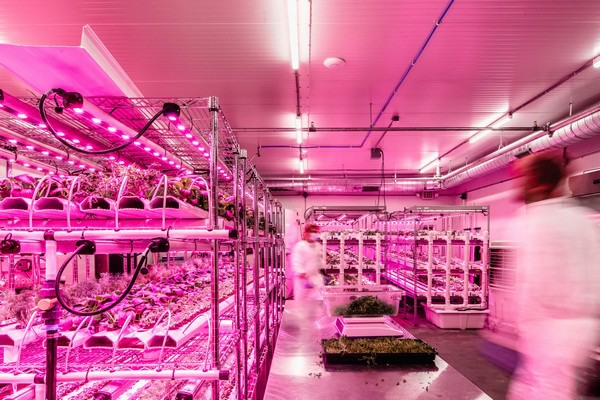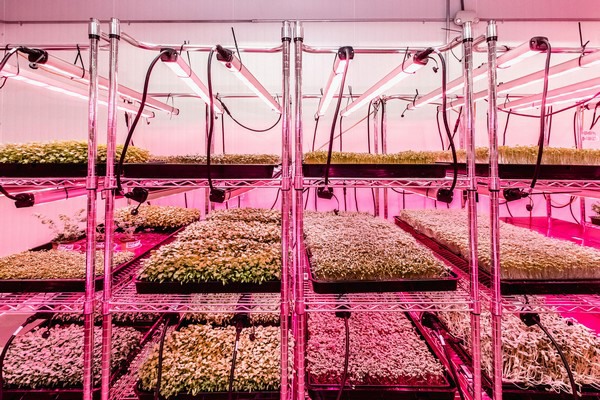Planted Detroit is a controlled environment vertical farm, run by five enthusiastic entrepreneurial growers. “As a team, we’re trying to make the best decisions for the plants, the company and our community,” Meg Burritt, managing partner of business development, says.
“Planted Detroit’s salads are a unique product, including our own baby greens, microgreens and herbs. It basically takes salads to another level”, Simon Yevzelman, managing partner of biosecurity, says. The indoor farm produces all kinds of baby greens. “We’re not doing head lettuces just yet. We are in R&D with edible flowers, so hopefully in a few months we’ll be growing those, too,” said Burritt. The company is aiming to differentiate baby greens from fully grown produce of the same species, through an analysis of the nutritional makeup of the greens Planted Detroit has grown. “We want to differentiate ourselves from the competition, large scale soil growers.”

Planted Detroit’s ‘power lunch salad’
Scaling up
“Our CEO, Tom, started this farm for a number of reasons, one being he saw the lack of variety in fresh produce available in grocery stores, and the poor quality of what was available. [Tom] knew that he would be able to deliver better greens, grown in a way that is additive to the food system – not extractive. Soon, we will figure out to scale that effectively,” Burritt says. Planted Detroit is currently constructing new grow rooms in their facility, in part utilizing technology from a long-term partner, AmHydro. “Joe Schwartz, CEO of AmHydro, has been a great help to us.” The company is getting a new automated cultivation system which will be fully automating the production area. “Now is the time to invest in our systems and infrastructure. The new construction will deliver 1000 ready-to-eat salads a day. We’ve taken a pro-active approach since the beginning of the pandemic,” Yevzelman notes.

A full view of the farm
“We are excited about the upcoming months, because construction will come to a close. We built a firm consumer base over the past few years, so when launching direct-to-consumer salads we had a good starting market share. The farm is small-scale right now and we sell out everything we grow. Ultimately, there will be more greens to sell and we can satisfy more customers. However, we know the current risks and we’re fully anticipating a second wave [of Covid-19]. Now, we are definitely strategizing, trying to stay sustainable through this time, through direct customer engagement and social media sharing,” Burritt states.
Increase of local demand
There is noticeably more demand for fresh produce in South East Michigan and throughout the state. “The pandemic shut everything down and showed how we are really interdependent on others. Local produce supply keeps us safer and is a more secure food supply. We hope to see more of this demand as our produce is way fresher and more delicious. The great thing is that individual consumers are becoming more aware of that,” Burritt notes. Yevzelman shares, ”we maintained our production capacity throughout the pandemic, so we could continue to sell direct to local Detroit consumers without pause.”

Racks stacked with microgreens
Ups and downs
The past few months have been a rollercoaster for Planted Detroit. Before COVID-19 the company sold its produce to restaurant partners, but when restaurants were shut down they had to make some changes. “All the [Covid-19 cases] going on the East Coast back then, made us pivot the business the model. Thankfully, we had a backup plan in our back pocket as we anticipated on all changes happening,” Burritt says. The company already had strict food safety measures in place, which also work against the virus. “We built the company around food safety and our employees have always been more conscious of hygiene,” Yevzelman says. Production was not scaled back as a result of the pandemic and safety procedures were followed up tightly. The company obtained certifications to sell their fresh produce directly to consumers. A well-known partner of the company, Skidmore Studio, launched a fresh food e-commerce website, MichiganFields.com, during the peak of COVID-19 shutdowns in March. Planted Detroit has been selling the platform ever since.
Back on track
“The sales had been relatively steady, but they really popped up during the pandemic”, Burritt adds. So far, Planted Detroit still sells through MichiganFields.com and directly to consumers, including home delivery. Next to that, their greens are sold at Detroit’s Eastern Market at the Tuesday market and through fresh produce boxes, in combination with other fresh produce, for people who don’t want to be exposed to the virus while grocery shopping. This month, the company is back to normal production. “It’s business as usual for us again. Just this week restaurants started calling us for produce again. [Adding in restaurants again] will be a perfect customer mix for us, especially after the construction,” Burritt notes.
 For more information:
For more information:
Planted Detroit
Megan Burritt, Managing Partner of Business Development
Simon Yevzelman, Managing Partner of Biosecurity
admin@planteddetroit.com
www.planteddetroit.com
